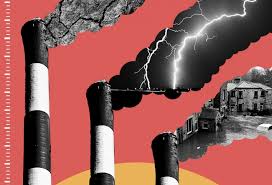APA – Nairobi (Kenya) – Government ministers and partners of the UNEP-convened Climate and Clean Air Coalition (CCAC) have put in place a raft of integrated climate and clean air initiatives designed to combat the triple planetary crisis of climate change, pollution, and biodiversity loss.
At the CCAC’s annual Climate & Clean Air Ministerial Meeting, which took place in Nairobi, Kenya, last week ahead of the sixth session of the UN Environment Assembly (UNEA-6), countries and partners launched a Clean Air Flagship effort to provide a platform to boost regional coordination and private sector engagement, data-led policy action, financing, science and advocacy.
The statement issued Saturday said that representatives from the public, private, and non-profit sectors discussed how to scale up implementation of country commitments to reducing emissions through the Global Methane Pledge and the Kigali Amendment through transformative action across key sectors.
Conference attendees also discussed progress on scaling up financing and implementing effective policies to reduce emissions of short-lived climate pollutants (SLCPs) such as cutting methane, black carbon and (HFCs), which are the fastest and cheapest way to reduce near-term warming and clean the air.
During the meeting, the UN Environment Programme (UNEP) and the CCAC launched a new report, Used Heavy Duty Vehicles (HDVs) and the Environment, which reveals that CO2 emissions associated with heavy duty vehicles have surged by over 30 per cent since 2000 and outlines a roadmap for reducing sector emissions through standardizing, monitoring, and greening freight strategies.
“We need to push harder on super pollutants. I encourage all of you to build on the momentum from COP28. Include super pollutants in Nationally Determined Contributions as they are being renewed. Finalize Methane Roadmaps. And, crucially, find new ways to finance action,” said Inger Andersen, UNEP’s Executive Director.
“Just as you need a superhero to defeat a supervillain, we need super solutions to face down super pollutants. And we need you to mastermind these solutions.”
Cities are often on the front line of pollution and climate action, but have limited access to finance, so the CCAC provides platforms to discuss the importance of multi-level governance, including through its work with the C40 Cities network.
Partners also welcomed a CCAC Technology and Economic Assessment Panel to help close the gap between technologies and finance by focusing on cost of measures, business models and how to overcome barriers to scale up climate finance.
“I think everyone here knows that we’re a very long way from winning the fight for clean air, clean water, and for a healthy planet. All our work — the plans we have put together for clean air and a healthy planet — must actually be turned into action and institutions. Without that, the planet remains in peril, our air dirty, and our water undrinkable,” said Ibrahim Auma, County Minister, Green Nairobi.
The Climate and Clean Air Coalition exemplifies the principles of multilateralism and robust partnership, showcasing how coordination and cooperation helps to tackle multiple crises.
“The very essence of life starts with a breath, a gasp of air that signifies the beginning of our journey on this earth.
CU/as/APA


